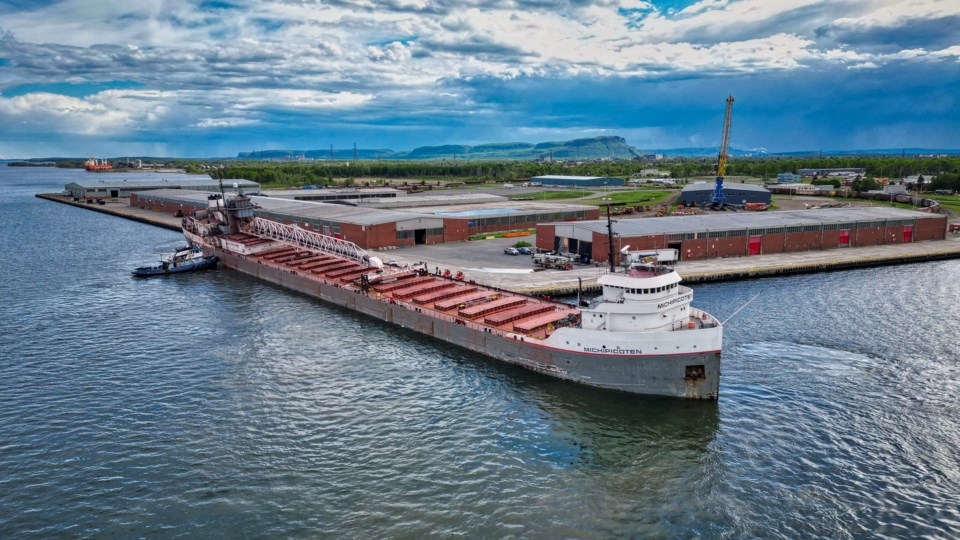THUNDER BAY — A crew from a Thunder Bay dive company has temporarily sealed the crack that caused an emergency aboard the Great Lakes bulk carrier Michipicoten on Saturday.
Water leaking through the hull caused a 15-degree list although bilge pumps were able to reverse the flooding, and the vessel was able to make it to Thunder Bay under escort.
The ship's owner – Lower Lakes Towing – and Canadian and American authorities continue to investigate the cause of the four-metre-long hull fracture but have said there's been no indication the ship struck something in the water between Two Harbors, Minnesota and Isle Royale.
"This appears to be a result of fatigue/structural failure," the Transportation Safety Board indicated Monday.
At dockside at Keefer Terminal on the weekend, a team from Big Lake Dive & Marine entered the water for an initial inspection, and located the breach in the hull.
Company owner Judson Beals told TBnewswatch the crew then went back down with welding equipment, accompanied by a specialist from southern Ontario, to patch the crack.
"We located the crack that they believed was on the hull of the ship, confirmed the length for them, and the size, and that was on Saturday. Then, on Sunday we were able to stop the leak, the water ingress, by putting on a plate with rubber for a temporary patch until it can get to dry dock and have proper repairs done."
Beals said all the water in the ship has been pumped out, and it is no longer listing.
He described the width of the crack in the hull as about a quarter of an inch, or "very minimal."
"I can't speak for the owner, but I believe it is repairable. The problem with our shipyard is they've closed down," he said, referring to the currently-idled Ontario Shipyards facility in Thunder Bay.
So far, there's no word from Lower Lakes Towing on its plans for the 72-year-old ship.
The U.S. Coast Guard has said a proper inspection will require offloading its cargo of iron ore pellets before it goes into dry dock.
On Facebook, a post attributed to a member of the Michipicoten's crew described the incident on the lake as a "horrifying journey," and said they were lucky the weather was on their side on Saturday.
He wrote: "We went through a day of pure terror...not know[ing] if we would see another day was frighten[ing]."
TBnewswatch has reached out to this individual, but has not received a response.
The Seafarers International Union doesn't represent the ship's crew but said it was happy to see no one was injured, and that it hopes everyone gets the support they need "following such a traumatic event."
In a brief statement Tuesday, a union spokesperson said: "It is important that the investigation is done diligently, and we look forward to seeing the results, as safety at sea is the number one priority to keep all Canadian seafarers safe on the job."
Transport Canada is investigating in conjunction with the U.S. Coast Guard.
In a statement, it said its role as the federal regulator is to determine if the circumstances of the incident included any non-compliance with the Canada Shipping Act.
A government marine safety inspector has been on the vessel twice since it arrived at Keefer Terminal.
Transport Canada said it continues to gather information, "and will take appropriate action should any non-compliance be identified."
The Transportation Safety Board of Canada is the lead federal agency for determining the cause and contributing factors of transportation incidents.
It has not deployed investigators to Thunder Bay, but said in a statement Monday that it has been gathering information to determine if an investigation is warranted.
"After analysis of preliminary information, it was determined that the occurrence is unlikely to yield new safety lessons that will advance transportation safety. Therefore, it has been classified as a Class 5 occurrence."
The TSB explained that Class 5 occurrences are not subject to full investigations followed by an investigation report, but information is recorded for possible future safety analysis, statistical reporting or archival purposes.
